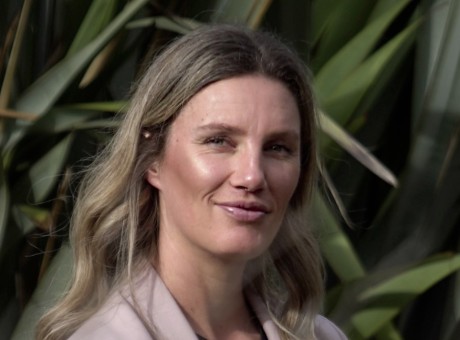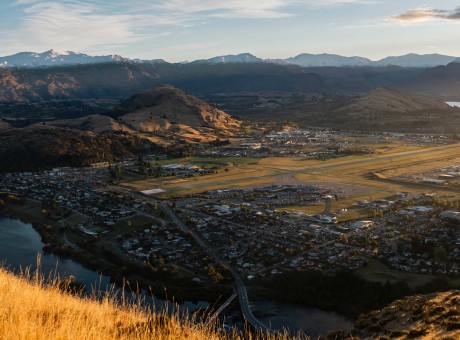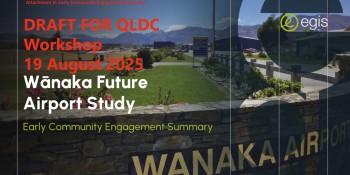Crux to cease publication – for now

Crux has made the reluctant decision to cease publication with immediate effect (Saturday, November 2). We are going into hibernation.
After six and a half years of successfully bringing strong local news coverage to an increasingly large, highly engaged audience in the Southern Lakes, we need to press pause for now.
Our business model relies on multiple revenue streams – money from government, money from advertising, and money from you, our audience.
The situation for Crux has a lot in common with other New Zealand news media. You will have seen the disappearance of Newshub, Today FM and massive cutbacks at TVNZ.
However, the situation in the regions is much more difficult. We are too small to benefit from the necessary scale of national digital advertising and vulnerable to the substantial and selective financial support of print media by our local councils.
Crux has been brave and bold. The prime minister is on the record as telling struggling news media to innovate, and as managing editor of Crux I can proudly say my team have tried, tested and implemented every single type of digital publishing innovation.

The Crux team in 2023. Debbie Knowles (sales), Nikki McKay (Wānaka editorial support and sales), Lauren Pattemore (journalist), Kim Bowden (editor/senior journalist) Peter Newport (founder and managing editor).
Our recent expansion to Dunedin has been successful in that our reader numbers have grown even faster than when we launched in Queenstown in 2018. However, the prospect of making enough money purely from our growing Southern Lakes and Dunedin audiences to guarantee sustainability is low.

Crux Dunedin editor/senior journalist Andrew Ashton.
Our research has shown that selective media spend by local councils has become one of the largest, if not the largest, sources of revenue for local legacy newspapers and news sites. Our concern is that this source of funding has become critical to media viability and a threat to local media independence.
Regional audiences need also to be aware that all news is not created equally. Many regional publications either don't employ full time qualified journalists or deliver only what's known as 'journalism of record' - that means just reporting what has happened, not why or how. Public interest investigative journalism is both rare and expensive, especially in the regions - but that's what Crux has delivered.
Crux receives zero funding from local councils.
Here’s a link to our official information act documents on this subject, that reveal the amounts of money involved. It’s enough to fund entire newsrooms. QLDC, CODC, DCC.
Many people don’t realise how big our audience is, and how small our team has been.
Crux achieves peak audiences of over 30,000 page views a day and an average of more than 400,000 page views a month, just in Queenstown, Cromwell and Wānaka. We have more than 40,000 unique users in the Southern Lakes alone, that’s two thirds of the population. The average time spent by readers on a Crux page is around two and half minutes that’s a very high indication of quality that few, if any, other news media platforms can match.
Our Facebook reach in a month can exceed 500,000. We deliver more than 1.6 million digital ad impressions a month.
Contrast that with our local print competitors. The Mountain Scene in Queenstown prints 16,000 copies a week, the Lakes Weekly Bulletin, 3,500 copies a week, and the total circulation of the Otago Daily Times print edition across Otago and Southland is 24,850 (Source: Allied Press March 2023 average daily sales).
Unlike the world of digital advertising and publishing, it is much harder to calculate the number of those print publications that actually end up in the hands of readers or how many pages get read by how many people, or for how long.
The basic cost of the legacy news media print and distribution process alone could make a substantial contribution to fund all New Zealand digital journalism. That’s worth thinking about, as well as the impact on the planet of the complex, and labour and carbon intensive delivery systems that newspapers require.
Add to that the fact that news by its very nature needs to be fast and immediate – you get the idea.
As owner and managing editor of Crux, I have never been able to take a salary from the business, and our editorial team peaked at two journalists, paid for by the then Labour Government’s Public Interest Journalism Fund.
When that fund ended in June this year, we had no choice but to make our Wānaka based junior reporter redundant only a week after she was recognised as joint runner up in the Best Up and Coming Journalist category at the Voyager Media Awards.
Now, after struggling over the past four months, we have had to part company with our wonderful editor and senior journalist Kim Bowden and our ball of sunny energy sales manager Debbie Knowles. Andrew Ashton, our new Dunedin editor, has built a huge readership in his short time in the role, but the path to sustainable digital revenue is just too steep.
So, from today, Crux is going to be put into a state of hibernation. Our hope is that our preferred solution, a Regional News Network, will find funding soon and that will allow us to come back to life and grow.
Our future is delightfully simple but surprisingly hard to get funded. A matrix of Crux digital news hubs – a Regional News Network. By the act of joining together multiple Crux hubs (between 10 and 17) on a national scale, advertising revenue increases exponentially and editorially our stories won’t be at risk of being dismissed as ‘regional’ or 'local’.
Everything starts to work. Even the Government’s own extensive studies, undertaken by the Ministry of Culture and Heritage and the Ministry of Business, Innovation and Employment (MBIE) since February 2023, show that our Regional News Network is a “viable option for regional news and in particular job creation in the regions”. (Source MBIE/MCH OIA email thread. March 18, 2024.)
As part of the same official information email thread, an MBIE business analyst provided his government colleagues with this summary of the Regional News Network"
“Why Regional News Network: Journalism in NZ is in a precarious position with staff reductions in major journalism companies (RNZ and Newshub) and the slow decrease in print media (newspapers) creating media voids, particularly in regional NZ. There is a need to increase media presence in regions to ensure community news still exists. Regional News Network will compliment print media until such time print media may not be as prevalent in the market. Regional News Network will have 17 hubs across New Zealand, with a headquarters in QTN and provide regional news on a digital platform.” (Source: OIA internal MBIE email - March 13, 2024.)
All of our Government funding requests have either been refused or lost between non-collaborative ministries.
In New Zealand it is now likely that there are fewer than 1,000 working, qualified journalists left. In 2006 there were more than 4,000 journalists in the country. Because of our small size we may be the first country in the world to see the disappearance of public interest journalism, with regional journalism the first to go.
There’s no taxpayer funded opposition in the regions to keep local councils honest. It is only the strong, qualified journalists that can do that job. It's not easy.
We’ve seen that elected council members are increasingly marginalised from actual decision making and the management of councils is now in the hands of what might be termed a corporatised elite of executives.
I ask that people who want to know what comes next subscribe to our Substack channel – from today it will be for paying subscribers only. No new content will be added to the Crux websites in the Southern Lakes or Dunedin. Our Facebook page will only promote paid Substack updates.
I’ll update our Substack channel with our ongoing investigations into the Queenstown Lakes District Council, the local media funding issue and our search for business partners and investors to progress the Regional News Network.
If enough people subscribe, we might even be able to get our team back together.
Substack subscriptions will also help keep the Crux website published so that readers can fully appreciate our body of work since 2018. There are more than 80 mini video documentaries to watch, all our top investigative work, our celebration of local success stories, and all the quirky stuff that has provided both shock and amusement.
We will stay in direct contact with our advertisers to make sure that any current campaigns are managed fairly. Thanks to all our advertisers, investors, subscribers and readers – we’ll be doing our best to make sure that this is not the end of the Crux story.
Crux has proved the extreme effectiveness of a small, highly-qualified editorial team producing strong hyper-local content that genuinely holds power to account. We’ve also proven that tens of thousands of people want to read this type of content every day.
The Crux model will make money, help keep communities together, ensure that journalism survives, create jobs and support local enterprise only when networked.
In recent months we have made some progress with Government. Minister Paul Goldsmith has agreed to look at diverting the huge amount spent by local government on potentially ineffective advertising to a central fund to support independent local journalism. He has told Crux and ministry officials that he believes we could do a better job than the Auditor General in holding local councils to account. We agree.
Under Secretary Jenny Marcroft has also been asked by Minister Goldsmith to undertake a review of regional media, including a comprehensive examination of council advertising.
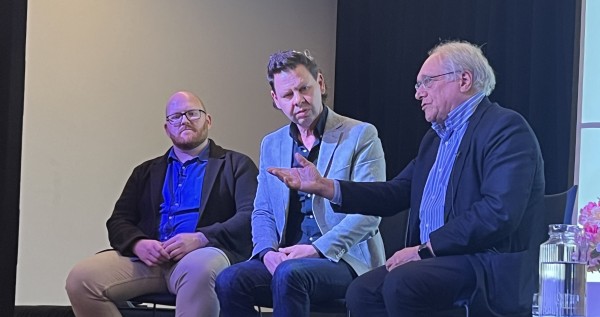
The Queenstown Writers Festival media panel - November 2. From left: Craig Hoyle (Sunday Star Times editor), Paddy Gower (Stuff) and Peter Newport (Crux).
Crux made the announcement of our interim withdrawal from publishing at the Queenstown Writers Festival as part of a media panel discussion on the future of journalism. Panel members included Paddy Gower and Craig Hoyle - moderated by Stuff’s Debbie Jamieson.
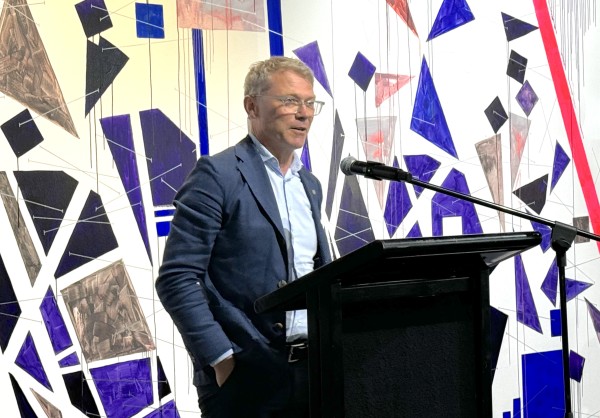
Media Minister Paul Goldsmith at the Queenstown Writers Festival.
Managing editor Peter Newport was able to have a brief conversation with Minister Goldsmith, who opened the festival.
Our request to the minister was 'please look after democracy'. Currently he’s the only person in New Zealand who can save strong regional journalism from extinction.
You can contact me at [email protected]





